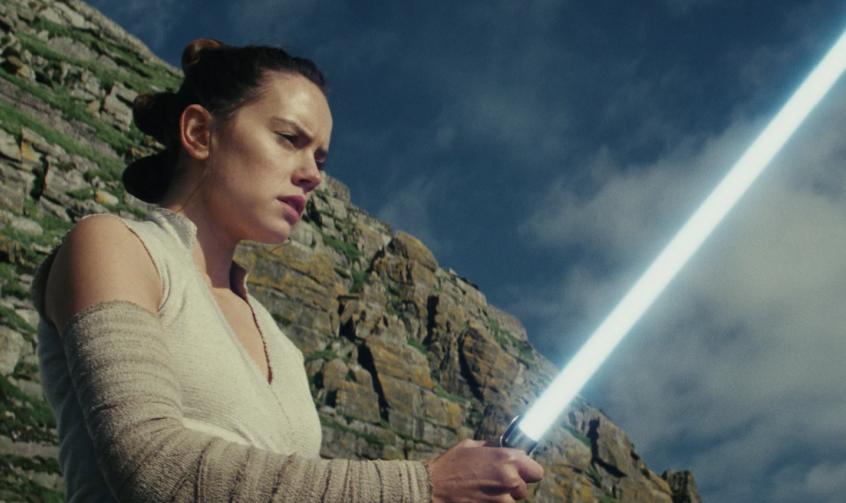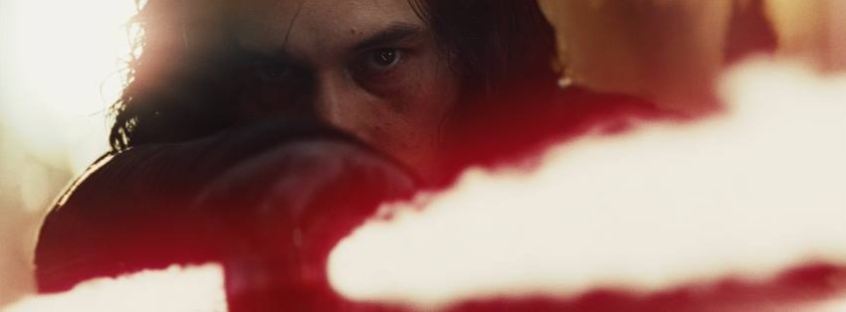May the Fourth be with you. Yes, you may be sick of hearing it already, but it's Star Wars day. A quirky pop culture phenomenon that sees legions of fans across the world celebrating the science-fiction franchise that transformed cinema and has continued to dominate Hollywood since its inception in 1977.
It's not quite a religious festival, but there is something curiously religious about the devoted fandom George Lucas' Star Wars has inspired, and something particularly spiritual in its mythology.

It might seem too easy: there's a cosmic battle between light and dark; there's a supernatural force that pervades the universe, holding all things together (and the sceptics who pooh-pooh the idea); there's the 'religion' (as the films call it) of the Jedi Order and Sith Lords; and there are individuals wrestling with their own souls, wondering if their destiny is with the light or the dark. It's a fun, thrilling and hopeful narrative that engages depravity and despair but holds onto victory – who couldn't love that? Even the Church of Scotland tweeted '#MayTheFourthBeWithYou' this morning, accompanied by a prayer over a comical image of LEGO Star Wars figurines at play: quite the franchise crossover.
In truth, the specifics of George Lucas' mythology lean more towards Eastern philosophy with the films' focus on 'oneness' and balance: there's no personal, involved creator God in Star Wars and certainly no Narnia-esque allegory at work. But that doesn't mean there aren't fascinating resonances that help explain the enduring popularity of the films and make for interesting conversation with Christian theology. Briefly, here are three.
Faith and higher powers
The films clearly dance with religious typology in their invoking of the Force, an unseen but apparently pervasive supernatural power that mere mortals may not understand, but should learn to trust. In the original Star Wars we meet Ben Kenobi, dismissed as mad old 'wizard' by some, but he teaches Luke Skywalker the religious rhythms of 'the Force' that can grant miraculous interventions, new ways to see reality. Others, like Han Solo scoff at the idea; it's all superstitious 'mumbo jumbo'. A few films later, after his own journey of discovery, he declares with wide-eyed reverence: 'It's true, all of it'.
This higher power is conflicted though, there's a 'light side' and a 'dark side' to the Force and much dramatic tension comes from seeing who falls on which side, and wondering if one will be victorious over the other. The films explore whether it's right to give into one's aggression and seek power, or to take the path of self-denial and peace. The questions of religious authority come up too: what significance does a 'prophecy' have for one's fate, and what if the religious establishment is wrong about the way of the world? What if the Sith are good and the Jedi are evil?
But despite that query, this isn't a 'relativist' story: the characters have serious moral and existential choices to make, an objective map of light vs dark and a galaxy at stake.
Family and failure
Like the narrative cycles of the book of Genesis, family is central to Star Wars, most centrally the Skywalker family, and the questions of legacy, destiny and responsibility that surround it. Perhaps the saga's most famous line is the dramatic reversal when (spoiler alert) the villainous Darth Vader reveals to the hero Luke Skywalker: 'I am your father.' It takes a cosmic conflict and makes it deeply personal: your greatest enemy turns out to be your nearest relative and the reason you exist. Evil is closer than you think.
Despite being a tale of triumph and joy, Star Wars also takes on failure and depravity, exploring what it looks like to fight for the good but to lose faith or to give in to the dark. Anakin Skywalker wrestles tragically with his inner demons in the prequel trilogy, and in Star Wars Episode VIII: The Last Jedi, an aged and emotionally broken Luke Skywalker confronts his own past: the epic expectation around his name and his profound failure to live up to it. How do we deal with the 'sins' of the past? These aren't dull, predictable adventures where the 'good guys' always win: they're complex (if still child-friendly) stories about how hard being 'good' can be.

A galaxy far, far away
Every Star Wars film begins with the brilliant, now iconic preface: 'A long time ago in a galaxy far, far away'. It's an introduction that sets us up not for piece of science fiction that predicts the future for a technologically advanced humanity in space, but a 'fantasy', a myth from a time and world we'll never know. It invokes the supernatural ('the Force') without trying to explain it. The mystical remains present, unknown and yet a driving force. It's a diverse, galaxy spanning story that explodes our imaginations while keeping us grounded with themes of family, virtue and sacrifice.
Perhaps Christians in particular love it so much because it provides a narrative wherein the fantastic is possible, where goodness can win, even when evil seems to overwhelm.
The fans know it's a story, but that doesn't make it less meaningful or inspirational, or less communally formative. It's a meta-story that's dominated western pop culture for more than 40 years, and that today brings millions together as though they were in church, to declare across the internet that beloved benediction: 'May the fourth be with you'.
As the more traditionally religious like to say: 'And also with you.'
You can follow @JosephHartropp on Twitter













